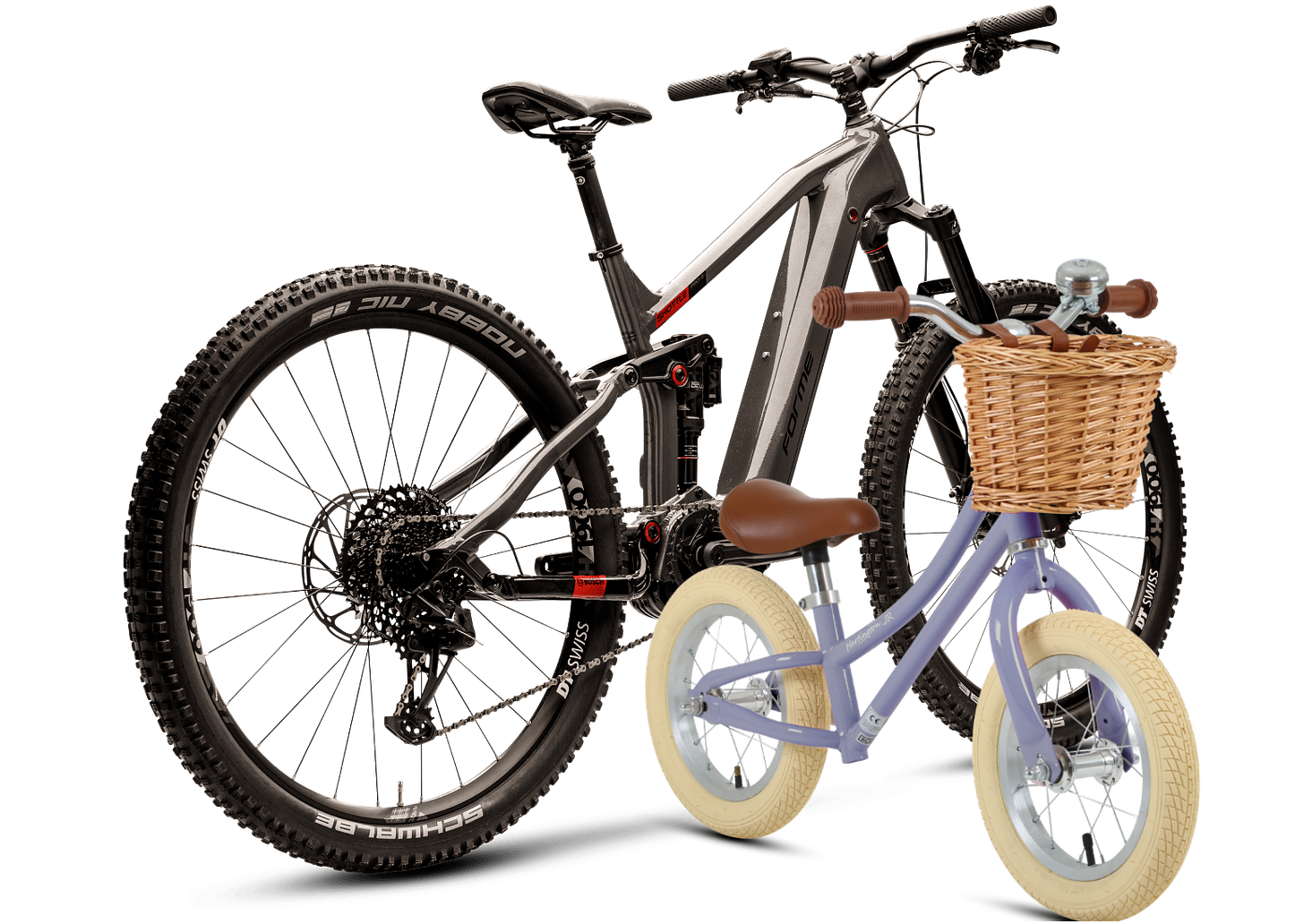Zen and the New Art of e-Bike Maintenance
The focus on getting Britain's population on two wheels hasn't necessarily meant it's halcyon days for Independent Bike Dealers (IBDs). We talk to one new IBD who’s making a pretty good go of it.
We will build first hundreds, then thousands, of miles of segregated cycle lane and create more low-traffic neighbourhoods to stop rat-running and allow people to walk and cycle.
We will also launch a national programme of support to increase uptake of electric bikes.
Source: HM Government Ten-Point Plan, Nov 2020.
With cycling firmly positioned as a Net Zero and post-Covid priority, and with bodies like Active Travel England and Scotland’s Active Travel Framework slowly becoming, erm, active, one could be forgiven for thinking that after years of rocky business conditions, life for the UK’s 1,600 or so Independent Bike Dealers (IBDs) is looking rosy. Well perhaps, though not necessarily.
While the Department for Transport claims that cycling is up by one-third on pre-pandemic levels, preview data from the Bicycle Association reports that UK bike sales are down by a quarter over the same period, while e-bike sales - despite the push in the Ten Point Plan - have stalled. The one growing area is eCargo, sales of which increased by 37% in the 12 months to May 2022, compared to the previous year. One to keep an eye on, thinks The Green Edge.
Some new entrants to the IBD market have failed spectacularly. One such business of which The Green Edge is aware on England’s south coast opened a year or so ago, with a heavily-leveraged stock of bikes supported by a full-time sales team in place from Day One. Now, not only has demand fallen, but supply too. The writing, for that business at least, is on the wall.
At the other end of the scale, though, bike service businesses - particularly those who establish a reputation for setting up, servicing and repairing bikes properly1 - are doing well. Government encouragement to Fix Your Bike2, as well as growing communities of city commuters and cycling newbies - all supported by cool apps like Hubtiger that link cyclists to repairers - have all contributed to increased demand. Micro workshops, often starting with a single bike enthusiast working out of a home garage, can be locally successful, although access to premium spares via trade accounts with the big suppliers and distributors like ZyroFisher, Madison and Hope often depends on setting up more commercially-recognisable bricks-and-mortar premises.
One business that is growing nicely in these turbulent times is Wheelie Bike Shop of Poole, Dorset. Run by Michael Maiden, a 20-year-old downhill racer who started the business as a home-based repair shop, he started Wheelie to fund his passion for racing while he was still at school. Then, after leaving school at the end of the crazy non-exam year of 2020, Michael opened his first business premises in February 2021, with the intent of growing Wheelie into a fully-fledged workshop with online and in-store sales of premium parts and - ultimately - bikes.
A small amount of seed funding helped him to fit out the shop - a business unit at Poole’s Arena Business Centre - and establish his starting inventory. Arena offered a semi-serviced, flexible rental model which meant that Michael could have exited within a year if the venture hadn’t worked out. He comments: “It was scary for me moving into the shop, but it was a lot less scary than if we’d had to commit to a really expensive unit for multiple years in advance”.
So far, the venture is working. The firm broke even in its first year of full-time trading and looks set to do at least as well in 2022. Growth has been deliberately organic and built on the growing reputation of the workshop, accompanied by canny use of the Shopify eCommerce platform and Google Ads for online and in-store sales. Michael describes how the online presence extends Wheelie’s reach beyond its home town: “I'm lucky that we do the online sales as well. Obviously, social media is a global thing, and we have followers from all over the UK. They might be in Scotland, we're in Poole. Although we're hundreds of miles apart, they can still support us by buying bits online, whereas you might be a really big fan of one of my competitors down the road, but [without the online presence] unless you drive to their shop, you can't support them. So I think that's a pretty major thing”.
Of course, being young and going racing has helped to build a ‘cool’ brand identity and Michael tells us Wheelie has a loyal fan base as a result. A lot of fans have been acquired through his social media content, good examples being short ‘unwrapping’ videos and other posts when new stock arrives.
But, as has been well documented elsewhere, unstable inventories have been a major problem across the cycle industry throughout the pandemic and into 2022. Not only is this a problem for sales and cash in, but also can be a big hit on cash out as, like proverbial London buses, long-awaited parts all come in a rush and need to be paid for. Michael tells us about three big forward orders for large baskets of parts he placed with one of his main suppliers back in Q2 of 2021. The intention was that each basket would be delivered in each of the successive quarters. The chart below shows how the cash outflows from the deliveries against those orders turned out:
Source: Wheelie Bike Shop / BMI
We can see that parts from the first order (in blue) requested for Q2/2021 were delayed, with some still on backorder even now, in August 2022. Meanwhile, deliveries from the other two orders were either delayed or came in over the top of the previous ones. Michael describes how fostering good relationships with his suppliers has meant that when parts do become available, he does have some control over which ones are actually delivered. That way, he doesn’t find himself being forced to take delivery of lots of parts he would struggle to store and sell in a reasonable timeframe. But the strain of lumpy cashflow is a problem for any business, particularly young ones like Wheelie.
This isn’t necessarily the fault of the suppliers and distributors, though. The better ones do operate fair share policies and give as much visibility as they can into what’s coming down the pipe. But with most of the world’s premium parts - particularly those with fiercely-loyal brand followings like Shimano and SRAM - being manufactured in countries like Taiwan, Malaysia and Singapore, supply problems caused by the pandemic and world shortages of shipping containers and tubular steel are widely claimed. This may all be true, but Michael adds: “I don't think anyone really knows the answer. Every supplier gives you a different reason. As soon as one problem is solved, there's another”.
Nonetheless, Michael is managing the inventories and cashflows, and Wheelie is continuing to grow. More recently, a small business loan has enabled him to move into the stocking and sale of complete bikes - a move that’s required him to completely rejig the configuration of the shop so that bikes for sale are kept separate from bikes in for servicing. He says, “No one should ever have to come into the shop and ask whether I sell bikes”.
Choice of which bike brands to sell has been a challenge. Most of the global brands like Giant and Santa Cruz are tied up by the gorilla (and chimp) retailers, while many of the quality European brands - like Andorra’s Commencal - are now either subject to post-Brexit import tariffs (14% on bikes, 6% on eBikes) or have gone into direct online sales, or both. But the Forme Bikes range from Moore Large is proving a perfect fit – and they’re British! Michael originally bought a small number of Forme mid-range bikes earlier this year, for a toe-in-the-water experiment into bike rentals, but quickly added a dealership agreement to his portfolio.
Image: Forme Bikes
Forme builds a wide range of bikes, from junior balance models to full-suspension trail ebikes. Michael is even in the process of selling one of Forme’s folding city e-bikes to a London-based client. Pole position on Wheelie’s sales podium right now is a Monsal 2 gravel bike3 and he’s finding that that the junior all-terrain bikes are also proving popular. Importantly, Forme has a focus on selling well-priced, quality bikes to the UK market through IBDs like Wheelie, with Moore Large’s brand director Adam Briggs saying in 2021: “we are completely devoted to meeting the needs of our retailers first and operate a single channel route to market to support them. I believe if we get that part right, the consumer will achieve the best experience and our brand will receive the treatment it requires to continue its progression.”
Michael agrees and, looking ahead, welcomes Forme’s continuing expansion into e-bikes. Skilling up to fully incorporate e-bike maintenance into the Wheelie portfolio will, however, require investment. While the mechanical maintenance of e-bikes - brakes, forks and the like - uses the same skillset that Michael and his small team have mastered through their years of keeping their road and downhill bikes safe and race-fit, servicing the motors is something else. Motor manufacturers like Bosch require courses to be attended, dedicated PC’s to be purchased, and dongles to be earned to run the on-board diagnostics. When he sees the e-bike critical mass is reached, Michael will make that investment.
And he thinks that point will come pretty soon. Despite the flattening of e-bike sales we mentioned earlier, he says: “The number one question I’m asked when someone comes into the shop is, do you do e-bikes?” Slightly surprisingly, he adds that his own next bike will be an e-bike. He explains: “I enjoy going down the hill on my bike. But what's the point in being unhappy on the way up and spending three-quarters of my time pedalling to the top when I could zoom up to the top in half the time on an e-bike?”
A good point well presented, we feel.
Our thanks to Michael Maiden of Wheelie Bike Shop for this Green Edge interview
The Green Edge needs sponsors
To keep The Green Edge free to subscribers, we’re asking for a small amount of sponsorship. Your sponsorship may be linked to a specific piece of content, a steer you would like to give us, or simply in recognition that we’re adding value to the green economy narrative. It could a one-off contribution or in more regular instalments. At whatever level, your support will be much appreciated.
If you’d like to talk to us about sponsorship, please email us by clicking the button below. Thank you.
As ever, the cowboy stories abound. One such story - well validated – concerned the very recent setting up of a new bike from one of the biggest UK bike retailers (who shall remain nameless). The bike was handed over to the customer with the forks fitted the wrong way round.
Albeit now withdrawn.
After researching this post, this writer is now trying to figure out how he might get one of these beauties on to his Christmas present list.






